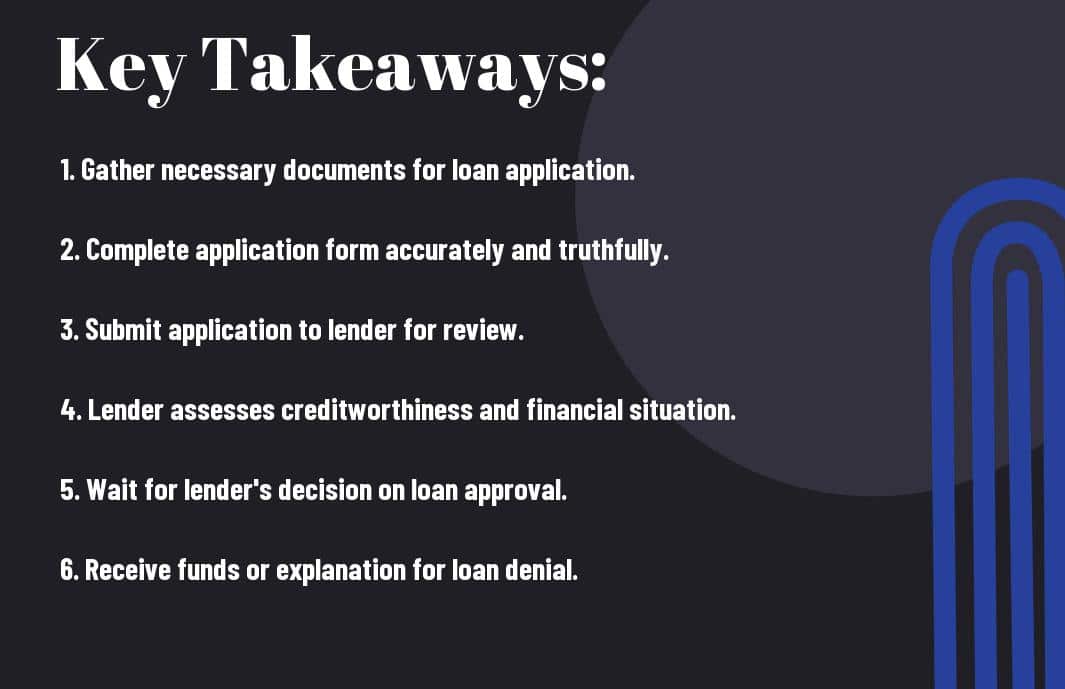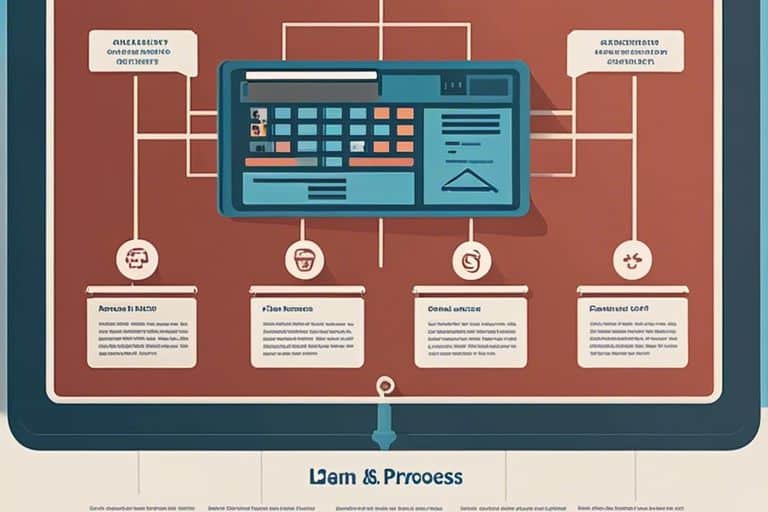You know you’ve got big dreams and aspirations, but making them a reality sometimes requires a little financial assistance. That’s where understanding the loan application process can be a game-changer. From gathering your financial documents to comparing interest rates and submitting your application, each step in the process is crucial. Missing a detail could mean the difference between getting approved for a loan that propels you towards your goals or facing a roadblock. So, buckle up and get ready to dive deep into the world of loan applications because with the right knowledge and preparation, you can make your financial dreams a reality!
Key Takeaways:
- Start Early: It’s important to begin the loan application process as soon as possible to allow ample time for gathering required documents and addressing any potential issues.
- Organize Documentation: Having all necessary documents organized and ready can help streamline the application process and increase your chances of approval.
- Communicate Clearly: Clear communication with your lender throughout the application process is key to ensure timely progress and address any questions or concerns that may arise.

Decoding the Credit Score Game
The Score That Opens Doors
Now, understanding your credit score is crucial when it comes to applying for a loan. This three-digit number holds the key to whether or not you’ll be approved for that dream loan. The higher your credit score, the better your chances of getting approved for a loan with favorable terms and lower interest rates.
Boosting Your Numbers Like a Pro
That’s right, my friend! It’s time to take control of your credit score and boost those numbers like a pro. By making sure you pay your bills on time, keeping your credit card balances low, and avoiding opening multiple new accounts at once, you can see a positive impact on your credit score. Recall, small habits can lead to big results when it comes to improving your credit score.
Decoding the credit score game can seem daunting at first, but it’s not as complicated as it may seem. By understanding the factors that influence your credit score, like payment history, credit utilization, length of credit history, new credit accounts, and credit mix, you can take proactive steps to improve your score. Recall, knowledge is power, and when it comes to your credit score, a little bit of effort can go a long way. So, roll up your sleeves and start taking action to boost your credit score like a boss!
Documentation: The Proof in the Paperwork
Must-Have Docs to Make It Rain
Paperwork may not be the most exciting part of the loan application process, but it is absolutely vital. Concerning proving your financial stability, you need to have all your ducks in a row. This means having key documents like pay stubs, bank statements, tax returns, and any other financial records that show your income and assets. Without these, lenders won’t be able to assess your ability to repay the loan.
Organizing Your Financial Story
MustHave Organizing your financial story is like telling a compelling tale to lenders. You want to highlight your income stability, savings, and any other positive financial factors that make you a reliable borrower. By organizing your financial documents neatly and in an easy-to-understand way, you’re making it easier for lenders to see why you’re a great candidate for a loan.
For instance, having separate folders for your pay stubs, tax returns, and bank statements can eliminate any confusion and show consistency in your financial history. Be mindful of, the more organized and transparent you are, the smoother the loan application process will be.

Navigating Loan Types: Choosing Your Path
Once again, if you are stepping into the world of loans, it’s crucial to understand the different options available to you. Choosing the right loan type can make a significant impact on your financial journey. To make the best decision for your circumstances, you need to be aware of the various loan types, their terms, and how they align with your financial goals.
| Loan Type | Description |
| Personal Loans | Flexible loans that can be used for various purposes. |
| Business Loans | Funding options designed specifically for business needs. |
| Student Loans | Loans to cover education expenses. |
| Mortgage Loans | Loans for purchasing real estate. |
| Auto Loans | Loans to finance a vehicle purchase. |
The Alphabet Soup of Loans
On your loan journey, you may encounter a mix of acronyms and loan jargon that can be overwhelming. From APR to LTV, understanding these terms is crucial in making informed decisions. Research each term carefully to ensure you grasp the implications for your financial health.
Matching Loans to Your Hustle
To set yourself up for success, it’s crucial to align your loan choice with your financial goals and objectives. Whether you are a budding entrepreneur or a seasoned professional, finding a loan that matches your hustle can propel you towards your dreams. Consider the terms, interest rates, and repayment plans that fit your unique situation.
Navigating the loan landscape can be daunting, but with the right information and mindset, you can confidently choose the loan type that suits your needs. Remember to weigh the pros and cons of each option and seek professional advice if needed. Your financial future is in your hands, so make sure to choose wisely.
The Application: Crafting Your Pitch
For a successful loan application, it’s crucial to craft a compelling pitch that highlights your financial health and ability to repay the loan. This is your chance to demonstrate why you’re a trustworthy borrower. To understand the mortgage loan process better, check out Understanding The Mortgage Loan Process for more insights.
Breaking Down the Application Steps
On your journey to securing a loan, you’ll need to follow specific steps during the application process. From gathering financial documents to submitting your application, each step plays a vital role in determining your loan approval.
Common Pitfalls to Dodge
For many borrowers, there are common pitfalls that can derail the loan application process. One of the most crucial mistakes to avoid is providing inaccurate or incomplete financial information. This can lead to delays in the approval process or even result in a denial. It’s important to be transparent and supply all required documentation to avoid any roadblocks.
For instance, failing to review your credit report before applying for a loan can be detrimental. Your credit score plays a significant role in the loan approval process, so it’s crucial to address any errors or areas of improvement beforehand. By taking the time to address these issues proactively, you can increase your chances of a successful loan application.
Safety First: Understanding Loan Terms
APR vs. Interest Rates: Know the Difference
Keep in mind that APR (Annual Percentage Rate) and interest rates are not the same. While the interest rate reflects the cost of borrowing the principal loan amount, the APR includes the interest rate as well as any additional fees or costs associated with the loan. Understanding this difference is crucial in assessing the true cost of borrowing.
Fees & Penalties: Don’t Get Played
Any savvy borrower knows to watch out for sneaky fees and penalties that can turn a seemingly good loan deal sour. Lenders may charge origination fees, prepayment penalties, or late payment fees that can significantly increase the overall cost of borrowing. Before signing any loan agreement, make sure to carefully review and understand all potential fees and penalties involved.
Terms: Pertaining to loan terms, always be on the lookout for any hidden fees or penalties that could catch you off guard. Some lenders may try to slip in clauses that allow them to charge exorbitant fees for things like late payments or early repayment. Make sure to carefully read through the terms and conditions of the loan agreement, and if anything seems fishy, don’t hesitate to ask questions or seek clarification. Be mindful of, knowledge is power when it comes to navigating the loan application process.
Conclusion
Drawing together the ins and outs of the loan application process step by step provides a roadmap for success in securing the funding you need. By understanding each stage, from gathering necessary documents to closing the deal, you can navigate the process with confidence. Keeping in mind the importance of communication and transparency with your lender, as well as staying organized and proactive, will give you a competitive edge. For more detailed information on the 5 basic steps of the loan approval process, visit The 5 basic steps of the loan approval process resource.
FAQ
Q: What documents do I need to apply for a loan?
A: To apply for a loan, you typically need to provide proof of income, identification documents, proof of address, and details of any assets or liabilities you may have.
Q: How do I improve my chances of getting approved for a loan?
A: To increase your chances of loan approval, work on improving your credit score, pay off existing debts, and ensure all your financial documents are in order before applying.
Q: What is the loan application process like?
A: The loan application process involves submitting your application form, providing the required documents, undergoing a credit check, and waiting for approval from the lender.
Q: How long does it take to get approved for a loan?
A: The time taken to get approved for a loan varies depending on the lender, the type of loan, and how quickly you provide all the required documentation. It can range from a few days to a few weeks.
Q: What happens after my loan is approved?
A: After your loan is approved, you will receive a loan offer detailing the terms and conditions. If you accept the offer, the funds will be disbursed to you, usually within a few business days.
Q: Can I apply for a loan online?
A: Yes, many lenders offer online loan applications. You can fill out the forms, upload your documents, and track the progress of your application all online, making the process quick and convenient.
Q: What should I consider before taking out a loan?
A: Before taking out a loan, consider your ability to repay the loan, the interest rate and fees associated with the loan, and whether the loan is the best option for your financial situation.





